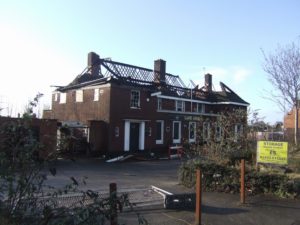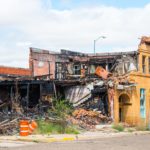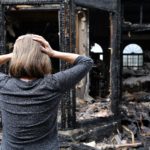Flames that explode into a raging home fire cause a staggering $6.7 billion in damages annually. Cooking fires are the leading cause of home fires in the nation. Heating equipment is a close second as the origin of house fires. As kitchen equipment and heating appliances are the standard gadgetry found in all homes, as well as other flammable sources, fire insurance becomes a necessity for homeowners.
While the occupants of a home are fortunate to avoid the effects of a devastating house fire, the blaze snatches irreplaceable valuables and personal mementos. A standard homeowner’s insurance policy covers most possessions in the event of a house fire, but the cause of the fire dictates whether or not insurance reimbursements are paid out.
Natural Disasters

Wild Fires
Homes that are dotted along high-risk areas for wild fire, such as those in northern California, are rarely fully covered by standard insurance. The higher risk for damage in an area plagued by wild fires will necessitate the homeowner to purchase supplemental insurance policies specific to the risk.
Lightning
Lightning strikes can spark fires, destroy electrical devices and ruin wiring inside the walls of a home. Most standard homeowner’s insurance policies cover fires caused by lightning, without exclusions.
Damage from lightning is easy to detect, making collecting insurance claims straightforward. Insurers advise against increasing the insurance coverage to specifically safeguard against lightning strikes.
Interior Causes of Fire
Kitchen Fires
The number of kitchen fires spikes dramatically during Thanksgiving and Christmas. Annually, 164,500 kitchen fires devastate homes, according to the US Fire Administration. Cooking fires that erupt in a kitchen are covered by standard homeowner’s insurance policies.
Prior to filing a claim, insurance experts recommend hiring a trusted contractor or engineer to assess the damage and provide a proper repair cost estimate. Knowing the accurate cost of repairs before filing is important to help determine if it is expedient to assume a cost that is less than the deductible or to figure out whether more significant, underlying damage exists.
Cigarettes
The US Fire Administration states that smoking is one of the most common—yet preventable—causes of house fires. Insurance companies are aware of the fire risk posed by household smokers and react accordingly. Smokers pay an estimated 20 percent more on their homeowners’ insurance premiums.
A fire sparked by an accidental incident, such as a lit cigarette, is covered by the homeowner’s insurance policy.
The US Fire Administration offers precautionary advice to smokers to prevent a deadly house fire. Included in the list of recommendations is to never smoke in bed or toss hot cigarette butts into a trash can and always rinse cigarette butts with water prior to throwing them out.
Faulty Wiring and Appliances
Homeowners are responsible for ensuring faulty wiring or broken electrical appliances are addressed immediately. Appliances, such as a dryer, can be the ugly source of a sweeping house fire. Faulty wiring, too, can cause fires to break out. Bad wiring may be identified by dimmed lights when using certain appliances, blown fuses and the need to disconnect one appliance in order for another to function.
Fires caused by electrical mishaps are generally covered by a homeowner’s insurance policy.
External Causes of Fire
Arson
Arson is an event in which the homeowner deliberately sets fire to his or her own home with the intent to collect insurance payouts. A criminal offense, arson is linked to insurance fraud.
When a claim is filed, investigators assess the cause of the home fire. If arson is suspected and shown as the cause of the fire, there are no insurance reimbursements.
Vacant and Vacation Homes
A vacant home has different definitions to various insurers. Most often, a home is considered vacant if the premises are unoccupied for 30 to 60 consecutive days, depending on the insurance company. Unoccupied homes are at greater risk for perils, like fire, raising the cost of insurance premiums.
In a vacant home that experiences a fire, the insurance company has no obligation to cover the cost of damages, especially if the insurance company can prove the house is unoccupied for the entire 30 to 60 days.
A vacation home can be insured, however. A summer home, for example, may be insured even if it is unoccupied for six months of the year. Insurance is purchased via an endorsement to the existing policy or seasonal and vacation coverage. Seasonal insurance covers numerous common risks, including fire.
Homeowners who occupy a home for only a portion of the year should confirm their policy remains in effect after 30 to 60 days. Insurance companies may offer package deals to cover multiple homes, such as the vacation home and primary dwelling, where residence is only part time.
Extreme Cases
While homeowner’s insurance covers many instances of house fires, coverage is rejected by certain events. Fires sparked by nuclear risks and acts of war are rarely covered by insurance. Fires caused by nuclear accidents are far from being farfetched; the Federal Emergency Management Agency says three million people in the US live ten miles from a nuclear power plant.
Emergency Fire Damage Restoration
If you live in the northwestern Chicago suburbs and your home is ravaged by a fire, contact Elk Grove Village’s most trusted name in fire and smoke damage restoration, ServiceMaster by Metzler. Skilled technicians employ high-tech equipment and safe cleaning agents to thoroughly cleanse the property of soot, along with its damaging effects of charring, discoloration and etching.
Included in ServiceMaster by Metzler’s restoration plan are emergency pre-cleaning services, content cleaning and pack outs, deodorization, and wall and ceiling cleaning. Smoke odors are also effectively removed with advanced chemical cleaners.
Smoke and soot damage are notorious for spreading rapidly, causing further destruction to objects in their path. Contact professional fire and smoke restorers in the wake of fire damage to prevent prolonged exposure to the ruinous soot and smoke.



